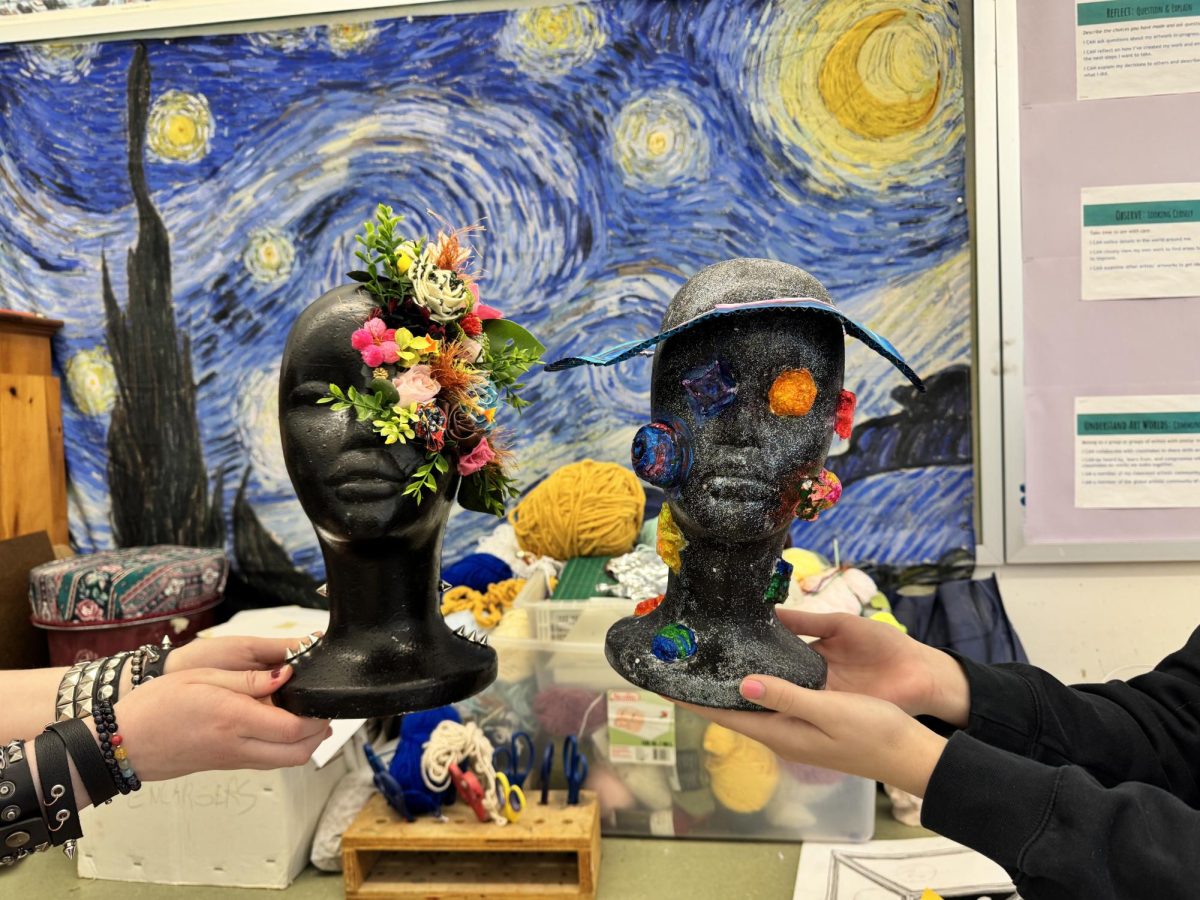by Stephanie Petrovick

And such a wall, as I would have you think,
That had in it a crannied hole or chink…” Picture by Stephanie Petrovick
The actors were trying on their costumes and making the final preparations for their performance of A Midsummer Night’s Dream. Everyone was cheerful, excited, full of energy,and loud.
“It’s definitely a play about confusion,” Director Sarah Worrest said.
Even in her third year directing, there was definitely a lot to do. The auditions had been in June, before the end of the last school year, and the scripts had to be given to the actors before summer started. The rehearsals started on the first day of school.
On top of the already crazy script of A Midsummer Night’s Dream, Worrest came up with backstories for the main characters, like Oberon, Titania, Puck, and Bottom. There was modern dress, and the characters were supposed to be in detention at a boarding school in Athens named Athens High.
For example, Oberon and Titania are supposed to be the drama teachers, and they are fighting over who will have the talented new kid in their play. Puck, one of the fairies, is one of the drama kids, and because she always gets better parts in Oberon’s plays than in Titania’s, she prefers Oberon. Bottom, the main actor in the troupe, had the twist that he purposefully got into detention, so he could be in the play because previously he had never been accepted in the drama club.
“A lot of it [the backstory] has to do with how they [the actors] carry themselves on stage,” Worrest said. “The backstory is more for the actor than the audience.”
Not only did Worrest add that twist, but it had to work with the play itself, and with the year’s chosen theme, the stuff dreams are made of. At the same time, she had to make sure to not make the play too crazy, and it all had to be simple and relatable. A Midsummer Night’s Dream is full of mystical things that usually pop up in stories or dreams.
“It’s good for the actors to not have a wacky script, like with blue wigs and bicycles on mars,” said Worrest. “The most fun part is when everyone has this moment, and they know what they’re saying, and they connect and bring this literary character to life.”
Brian Matthews, who played Bottom, has experienced the different complications of scripts. According to him, Bottom is very fun to play, mainly because he is written as the comic relief. Bottom is an obnoxious character who thinks he runs everything, but in reality he was written to be the funny character. To Matthews, the most difficult part of his character is when he turns into an asshead, because the donkey mask is hard to wear.
“He’s like when you have a blender on, and you’re trying to watch t.v.,” Matthews said, “and you just can’t hear anything.”

But even with the obnoxious persona, Matthews finds it easy to be in character.
“The audience kind of gives you the energy to stay in character,” said Matthews.
Stephanie Kall, who played Puck, had a bit more trouble. Puck is a fun character that could be a girl depending on the context. She, in this case, is very expressive, likes to move around, and is always telling jokes or pulling pranks.
“She’s [Puck’s] like that one teacher who tells a joke, but it isn’t funny,” Kall said.

For Kall, Puck is more difficult because of her tendency to move around so much. Kall is naturally a more serious person, and she now has to move around more than she normally would. But in playing Puck’s character, Kall has learned to let loose a little bit more. Her favorite part of playing Puck is “probably Puck’s almost stupid amount of confidence,” Kall said.
This is because, even though Puck knows when Oberon is angry, she insists on antagonizing him, not to mention being careless. This just goes against the normal way of things. The hardest part about staying in character for Kall is when another cast member laughs, because then she feels the urge to break character and laugh.
“It’s obviously a comedy written by Shakespeare, but I think it has some relevance to real life,” said Kall.





